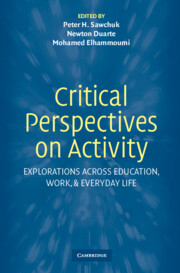Foreword by Seth Chaiklin
Published online by Cambridge University Press: 10 December 2009
Summary
The historical development of the cultural–historical research tradition can be understood conceptually in a simple dialectic of “oral-written-oral.” From the 1920s through roughly the 1970s, persons actively engaged in doing research in the cultural–historical tradition were likely to be living in Moscow, to have studied in Moscow, or to have regular access to persons who were living or had studied there. In short, the dominant form for coming to understand and work with the cultural–historical tradition was to be engaged in dialogue with others who were working in this tradition. Starting in the 1970s, many translated and secondary texts became available in several different languages and later included online and course materials. At present, interpretation of written texts is the dominant form by which persons learn about the cultural–historical tradition, without necessarily having access to the participants of the oral tradition from the previous historical period. During this “written” period, awareness, interest, and acceptance of the cultural–historical tradition has grown internationally, without a corresponding dialogical interaction among its “readers.” There is now a considerable diversity in which aspects of the historical tradition are known, emphasized, and investigated (which explains in part the variety of its descriptive labels, such as socio-cultural, cultural–historical activity theory, socio-historical, and so forth).
The appearance of a new oral period is desirable, but dialectical logic does not require such a transformation. It depends necessarily on the actions of researchers who work in this tradition, as well as the conditions that have developed until now.
- Type
- Chapter
- Information
- Critical Perspectives on ActivityExplorations Across Education, Work, and Everyday Life, pp. xi - xivPublisher: Cambridge University PressPrint publication year: 2006



